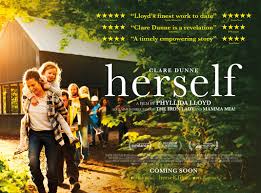Herself
Posted on January 7, 2021 at 5:33 pm
B +| Lowest Recommended Age: | High School |
| Profanity: | Some strong and crude language |
| Alcohol/ Drugs: | Alcohol |
| Violence/ Scariness: | Brutal domestic abuse, illness, adult and child injured |
| Diversity Issues: | Diverse characters |
| Date Released to Theaters: | January 8, 2021 |

Reflexive pronouns are used differently in the UK. In the US, we mostly use “himself” and “herself” to emphasize achievement: “He learned to ride his bicycle himself!” But in the UK those words are colloquially used as subjects, to refer to individuals. So, in “Herself,” a film co-written by and starring Irish actress Clare Dunne, a man who is helping her character with a big project hands her a tool to take the first step, saying, “We’ll let herself do the honors.” The title refers to both uses of the word, indicating agency and independence.
Dunne plays Sandra, who tells her daughters in the opening scene that the birthmark under her eye was God’s way of making sure he can always find her, because “there are a lot of Sandras in Dublin.” We can see immediately what a patient, loving mother she is, and then again as she dances with her daughters to Sia in their kitchen. But when her husband Gary (Ian Lloyd Anderson) comes home, the mood shifts subtly but unmistakably. In what is obviously a pattern, he sends the girls outside and begins to beat Sandra brutally. But this time is different. She has made a plan and whispered the code word to her older daughter. Soon they are in shelter space in a hotel.
Sandra sees a video of a man explaining how anyone can build a tiny house. Without any help from the social service agencies, she decides to do it — by herself.
But what that means is getting the help of other people, including a local builder named Aido (Conleth Hill), neighbors, and the disabled doctor she works for as a cleaning lady (the always-marvelous Harriet Walter, mistress of the dry delivery). Like all abusers, Gary had cut her off from other people. But learning to trust and to reach out is as healing as the house itself.
Little details add a lot of richness to the story, showing us instead of telling us. Sandra meets Aido when he rebukes a sales clerk for being rude to her. And we see Aido change his mind about saying no to her when his son Francis (Daniel Ryan), who has Down syndrome, quietly hands Sandra his old work boots to help her get started. Gary’s mother has a poignant confession. A sympathetic social worker (Cathy Belton) helps Sandra when Gary sues her for custody. And the scenes with the neighbors, many of them immigrants, who help build the house are charming and engaging. Dunne’s performance is deeply moving and the story is genuinely heartwarming.
Parents should know that this film includes domestic abuse. Adults and children are injured. There is some strong and crude language.
Family discussion: Why did Sandra tell the judge she was asking the wrong questions? What can we do to provide better support for people like Sandra?
If you like this, try: “Still Mine” and “Places in the Heart”
